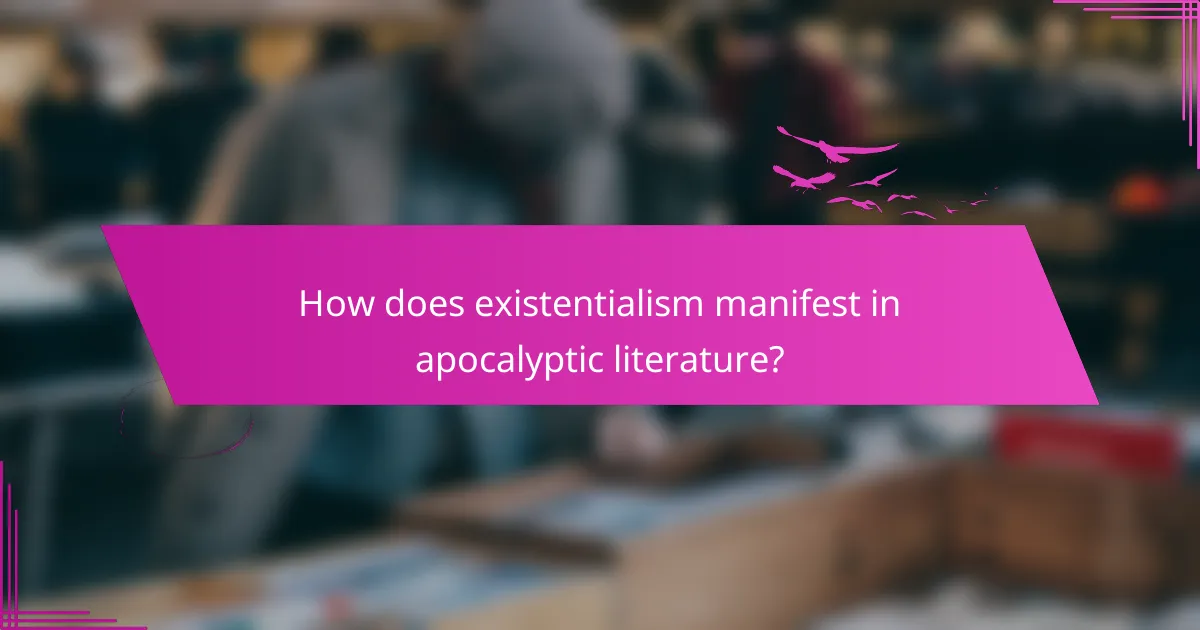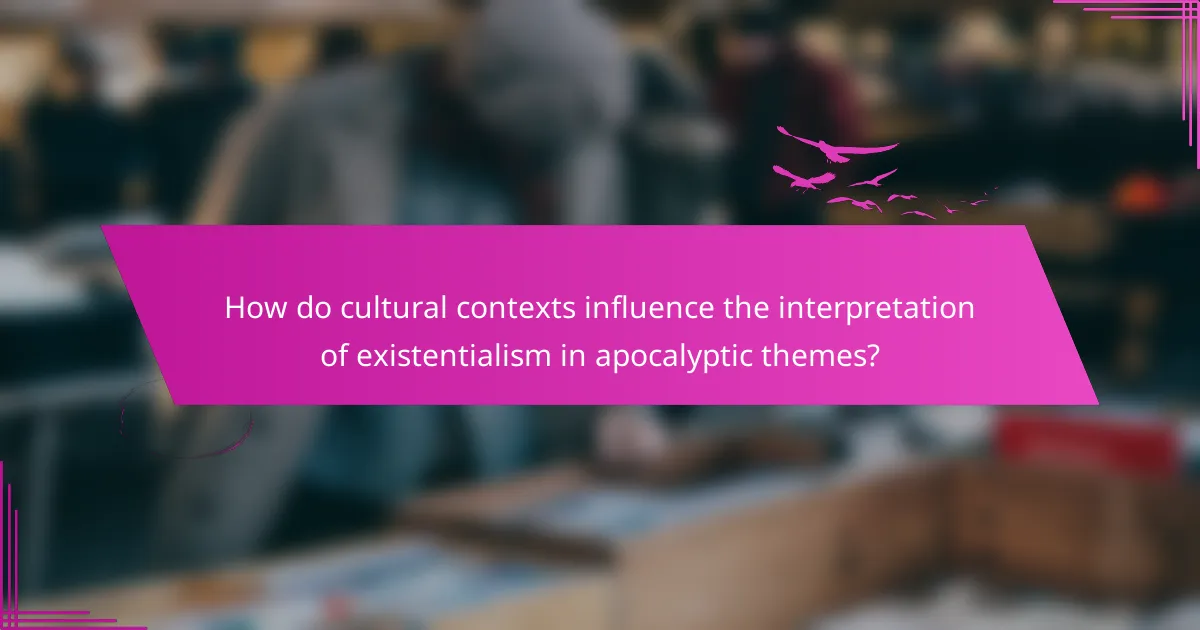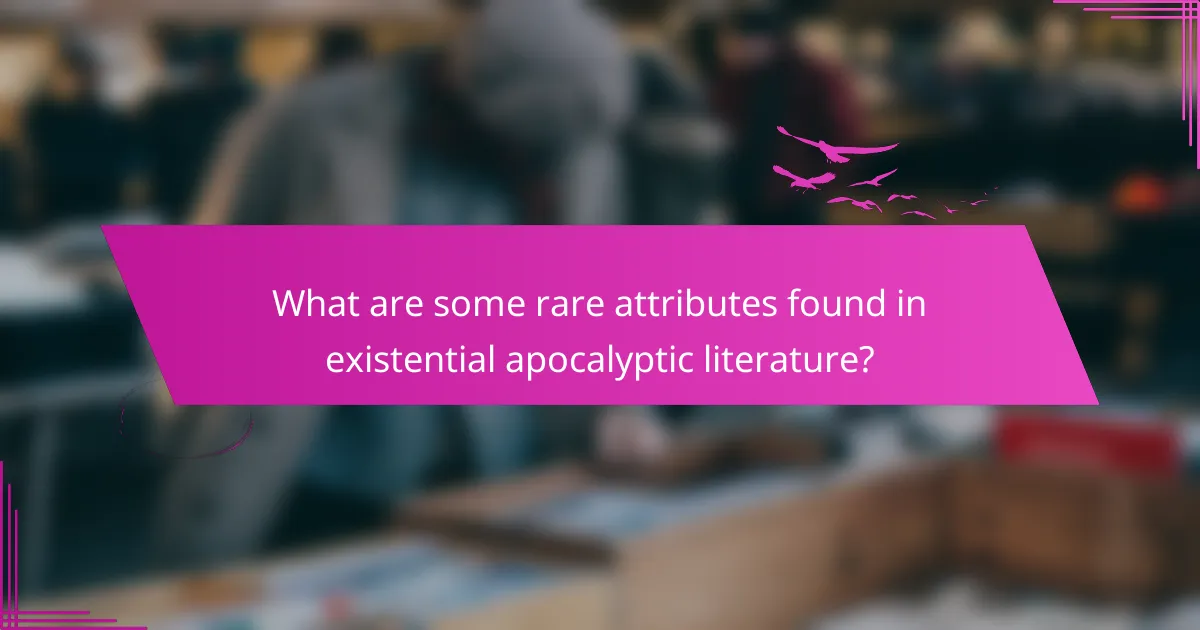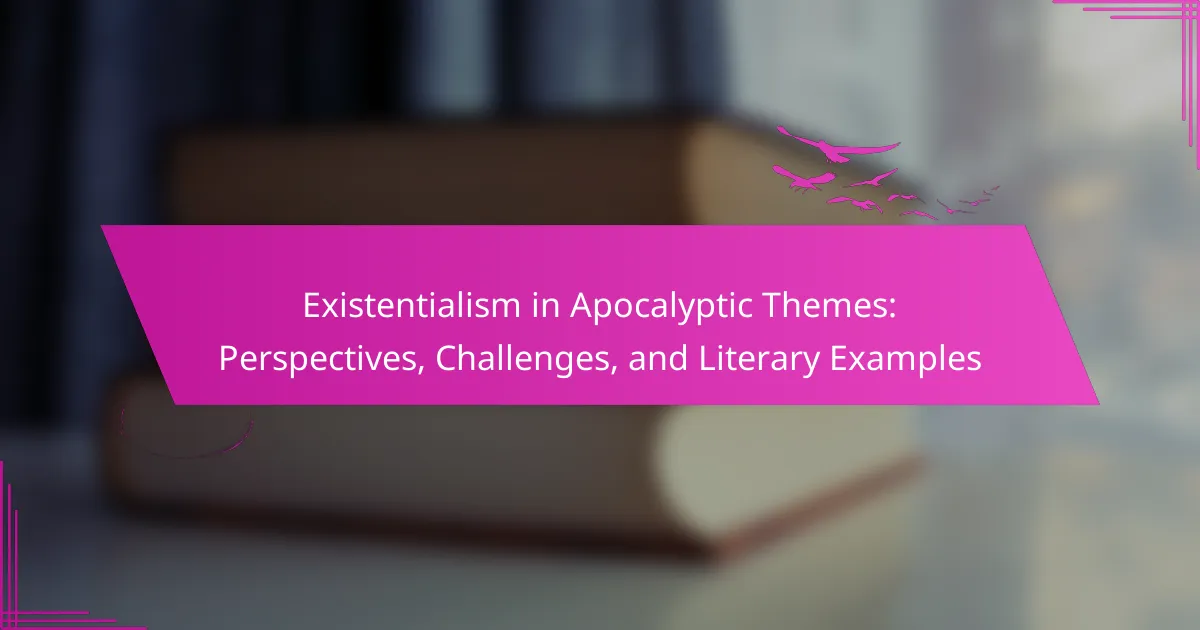Existentialism in apocalyptic themes raises critical questions about meaning and identity in chaotic environments. This article explores the challenges faced by characters, highlights literary examples, and examines cultural contexts that shape interpretations. Works like “The Road” and “Waiting for Godot” illustrate how these narratives reflect the human condition amid despair. Additionally, the article discusses rare attributes that provoke deep philosophical inquiries and emotional engagement.

How does existentialism manifest in apocalyptic literature?
Existentialism in apocalyptic literature often explores the search for meaning amid chaos. Characters confront profound isolation, moral dilemmas, and the absurdity of existence. Works like Cormac McCarthy’s “The Road” illustrate these themes through stark landscapes and human resilience. Similarly, “The Road” emphasizes the unique attribute of survival against overwhelming odds, showcasing the rare moments of hope that emerge in despair. Through these narratives, existentialist questions about purpose and authenticity become central, reflecting the human condition in extreme circumstances.
What are the core themes of existentialism in this context?
Existentialism in apocalyptic themes explores individual freedom, choice, and the search for meaning amidst chaos. Core themes include the absurdity of existence, isolation, and the confrontation with mortality. Literary examples often illustrate characters grappling with their identity and purpose in a world devoid of inherent meaning. This perspective challenges readers to reflect on their own existence and the implications of choice in uncertain circumstances.
Which philosophical questions arise in apocalyptic narratives?
Philosophical questions in apocalyptic narratives often center on existence, morality, and the human condition. These themes challenge characters and readers to confront the meaning of life amid chaos. Existentialism delves into individual purpose, the absurdity of existence, and the search for authenticity in a world facing destruction. Literary examples, such as Cormac McCarthy’s “The Road,” illustrate these dilemmas, prompting reflections on hope, despair, and ethical choices in dire circumstances. Such narratives invite deep contemplation on humanity’s resilience and the essence of existence itself.

What challenges do characters face in existential apocalyptic scenarios?
Characters in existential apocalyptic scenarios face profound challenges, including loss of identity, moral dilemmas, and existential despair. They grapple with the meaning of life amidst chaos and often confront their own mortality. Isolation amplifies their struggles, leading to psychological conflicts and ethical choices that question humanity’s essence. The search for purpose in a seemingly meaningless world becomes a central theme, as characters navigate survival while reflecting on their values and relationships.
How do these challenges reflect human nature?
Apocalyptic challenges reveal fundamental aspects of human nature, such as resilience and existential inquiry. These themes highlight the human struggle for meaning amid chaos. Literature often portrays characters confronting moral dilemmas, showcasing how individuals respond to extreme circumstances. For example, in Cormac McCarthy’s “The Road,” survival instincts clash with ethical choices, reflecting deep-seated values. This tension illustrates the unique attribute of existentialism in apocalyptic narratives, emphasizing humanity’s quest for purpose even in dire situations.
What role does isolation play in these narratives?
Isolation serves as a crucial element in existential narratives, emphasizing the individual’s confrontation with meaninglessness. It amplifies feelings of despair and introspection, compelling characters to grapple with their existence. In apocalyptic themes, isolation often reflects humanity’s ultimate separation from society, leading to profound self-discovery. This narrative device challenges characters to find purpose amidst desolation, illustrating the tension between isolation and the human need for connection. Such themes resonate with readers, prompting reflections on their own existential dilemmas in contemporary society.

Which literary examples best illustrate existentialism in apocalyptic themes?
Existentialism in apocalyptic themes is vividly illustrated in several literary works. Notable examples include “The Road” by Cormac McCarthy, which explores human resilience amidst desolation, and “Waiting for Godot” by Samuel Beckett, highlighting absurdity in a world devoid of meaning. “The Handmaid’s Tale” by Margaret Atwood presents a dystopian society that challenges individual agency, while “Station Eleven” by Emily St. John Mandel examines the importance of art and memory after societal collapse. Each work encapsulates existential themes, emphasizing the struggle for purpose in a seemingly indifferent universe.
What are the key works from North American authors?
Key works from North American authors exploring existentialism in apocalyptic themes include “The Road” by Cormac McCarthy, “Station Eleven” by Emily St. John Mandel, and “Oryx and Crake” by Margaret Atwood. These texts highlight the human condition, societal collapse, and ethical dilemmas. Each author presents unique perspectives on survival, identity, and morality in a world facing existential threats. The themes resonate with contemporary anxieties about climate change and technological advancement.
How do European perspectives differ in their portrayal?
European perspectives on existentialism in apocalyptic themes often emphasize human resilience and moral dilemmas. These portrayals differ from other cultural interpretations by focusing on individual agency amid chaos. For instance, French existentialists like Sartre highlight the absurdity of existence, while German thinkers such as Heidegger explore the relationship between being and time. These unique attributes shape the narrative, presenting a complex interplay between despair and hope. Additionally, rare literary examples from European authors, such as Cormac McCarthy’s “The Road,” illustrate the struggle for meaning in desolation, showcasing diverse existential challenges.
What unique attributes do specific characters bring to these stories?
Unique characters in existential apocalyptic stories often embody profound philosophical dilemmas. For instance, a survivor may represent resilience against despair, while a scientist could symbolize the struggle for meaning in chaos. These characters confront their mortality, prompting readers to explore themes of hope, identity, and the human condition. Their unique attributes, such as moral ambiguity or intellectual curiosity, deepen the narrative and challenge conventional perspectives on existence.

How do cultural contexts influence the interpretation of existentialism in apocalyptic themes?
Cultural contexts significantly shape how existentialism is interpreted within apocalyptic themes. Different societies bring unique perspectives that influence the understanding of existential questions in crisis situations.
For instance, in Western literature, existentialism often reflects individualism and personal responsibility during apocalyptic events. Works like Cormac McCarthy’s “The Road” highlight the struggle for meaning in a desolate world. In contrast, Eastern philosophies may emphasize collective existence and interconnectedness, as seen in Haruki Murakami’s narratives, which explore human relationships amid chaos.
Moreover, cultural backgrounds affect the portrayal of hope and despair in apocalyptic scenarios. In some cultures, apocalyptic themes serve as warnings or moral lessons, while others may view them as opportunities for rebirth and transformation. This divergence illustrates how existential themes are not universally interpreted but are deeply rooted in cultural narratives and values.
Overall, the interplay between cultural contexts and existentialism enriches literary explorations of apocalyptic themes, revealing diverse human experiences and responses to existential crises.
What are the regional variations in thematic expression?
Existentialism in apocalyptic themes varies regionally, reflecting cultural contexts and societal challenges. In Western literature, existential dread often highlights individual isolation, as seen in works like Cormac McCarthy’s “The Road.” In contrast, Eastern narratives may focus on collective survival and moral dilemmas, exemplified by Haruki Murakami’s “Kafka on the Shore.” These differences illustrate how existential themes adapt to regional values and philosophies, shaping unique literary expressions.
How do societal fears shape narrative elements?
Societal fears significantly influence narrative elements in existentialist literature, particularly in apocalyptic themes. These fears manifest through characters’ struggles, societal breakdowns, and moral dilemmas. For example, narratives often explore themes of isolation, uncertainty, and the search for meaning amid chaos.
The portrayal of societal collapse reflects real-world anxieties about environmental disasters, technological failures, and political instability. Characters embody these fears, facing challenges that highlight human resilience or despair. Unique attributes, such as the psychological impact of existential dread, deepen the narrative experience.
Literary examples like Cormac McCarthy’s “The Road” illustrate how fear shapes character development and thematic depth. This novel presents a bleak world where survival instincts clash with moral choices, emphasizing the human condition in dire circumstances.
Overall, societal fears enrich existential narratives, offering profound insights into human nature and the complexities of existence in apocalyptic settings.

What are some rare attributes found in existential apocalyptic literature?
Rare attributes in existential apocalyptic literature often include deep philosophical inquiries, unconventional narrative structures, and unique character development. These elements challenge traditional storytelling and provoke profound existential reflections. For instance, some works may explore the absurdity of existence through fragmented timelines or unreliable narrators. Additionally, these texts frequently highlight the fragility of human relationships in the face of impending doom, creating a stark contrast between individual struggles and collective despair. Such attributes contribute to the genre’s ability to engage readers on both intellectual and emotional levels.
Which unconventional storytelling techniques are employed?
Unconventional storytelling techniques in existentialism and apocalyptic themes include non-linear narratives, fragmented timelines, and unreliable narrators. These methods challenge traditional storytelling by emphasizing subjective experience and existential uncertainty. For example, authors may present events out of order to reflect characters’ disorientation in a chaotic world. This approach deepens the exploration of themes like despair and meaninglessness, inviting readers to engage with the text on a philosophical level.
What unique philosophical insights do lesser-known works offer?
Lesser-known works often provide profound philosophical insights by exploring existential themes within apocalyptic contexts. These narratives challenge traditional perceptions of existence, emphasizing human resilience and the search for meaning in chaos. For instance, works like “The Road” by Cormac McCarthy delve into the fragility of humanity, showcasing characters who grapple with moral choices amid desolation. Such literature invites readers to reflect on their values and the essence of life when faced with existential threats. This unique perspective fosters a deeper understanding of the human condition, revealing how apocalyptic scenarios can illuminate existential dilemmas.

How can readers engage with existential themes in apocalyptic literature?
Readers can engage with existential themes in apocalyptic literature by examining the human condition amidst chaos. These narratives challenge characters and readers to confront mortality, purpose, and identity. For example, works like Cormac McCarthy’s “The Road” explore despair and resilience, prompting reflection on existence. Engaging with these themes encourages deeper understanding of personal and collective human experiences in crisis.
What practical approaches enhance understanding and interpretation?
Engaging with existentialism in apocalyptic themes enhances understanding through critical analysis, thematic exploration, and literary comparison. Analyzing characters’ struggles with meaning in a chaotic world provides insights into human resilience. Exploring themes of isolation and despair reveals the philosophical underpinnings of existential thought. Literary examples, such as “The Road” by Cormac McCarthy, illustrate these concepts through vivid imagery and character development. This multifaceted approach deepens interpretation, fostering a richer comprehension of existentialism’s relevance in contemporary narratives.
What common mistakes should readers avoid when exploring these themes?
Readers should avoid oversimplifying existential themes in apocalyptic literature. Common mistakes include neglecting character development, misinterpreting symbolism, and overlooking philosophical nuances. Additionally, failing to connect themes to contemporary issues can diminish understanding. Engaging deeply with the text is essential for grasping the complexities of existentialism in these narratives.
